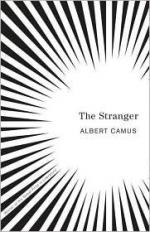|
|
The Stranger Author/Context
Albert Camus (1913-1960)
Born in Mondovi, Algeria in 1913 to working class parents, Albert Camus lived a youth of Muslim faith and solidarity. His father, a staunch French patriot, left home in 1914 when Camus was a baby to fight for France in the First World War. He was killed in battle, leaving his illiterate wife to raise Albert and his older brother alone. With the help of her mother, Madame Camus influenced her son's future career, as he later wrote frequently about mother-son relationships (and very infrequently about father-son relations). At the age of 17, Albert came down with a severe case of tuberculosis and was forced to leave home and begin his life exploring independence and a solitary existence. He studied hard and graduated from the university with a degree in philosophy with the goal of becoming a teacher. Camus took up work as a journalist, spent time in the theater, and wrote several controversial essays about Muslims in Europe. He had a short-lived (two year) marriage to Simone Hie and joined the French Resistance against the Nazis during World War 2.
With such personal and individual development, Camus found a niche in the world of existential thinking. According to Encarta Encyclopedia, existentialism is an overt emphasis on individual existence, and consequently a focus and challenge on subjectivity, individual freedom, and choice. Perhaps because Camus ventured into the world at a young age and found himself involved with the politics of World War 2, did he write so eloquently in this realm of literature and philosophy.
Camus died suddenly in a car accident in Paris in 1960, truncating a successful and influential career as a teacher, writer, journalist, playwright, and thinker. His library of work includes his first and most famous, The Stranger, The Myth of Sisyphus, The Plague, The Fall, The Rebel, A Happy Death, Exile and the Kingdom, Caligula and Three Other, The Possessed, Resistence, Rebellion, and Death, Notebooks 1935-1942, Notebooks 1942-1951, Lyrical and Critical Essays, and Cashiers I. His political essays and contribution to literature and philosophy have placed him amongst such company as Plato, Nietzche, and Kierkegaard, and several of his quotations have even become staples in political speeches and personal salutations.
"You will never be happy if you continue to search for what happiness consists of. You will never live if you are looking for the meaning of life."
It is such language as this quotation that places Camus in the foreground of academia and philosophy. Camus' works have been translated from their original French into countless languages and are studied in philosophy classes across universities around the world. He was awarded the Nobel Prize for literature in 1957.
Bibliography
Bronner, Stephen Eric. Camus: Portrait of a Moralist. Minneapolis: University of Minnesota Press, 1999.
Camus, Albert. The Stranger. New York: Vintage International, 1988.
Parker, Emmett. Albert Camus: The Artist in the Arena. Madison: The University of Wisconsin Press, 1965.
Thody, Philip. Albert Camus: A Study of His Work. London: Hamish Hamilton, 1957.




